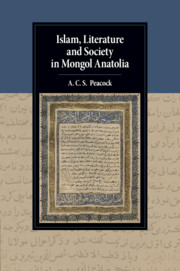Book contents
- Islam, Literature and Society in Mongol Anatolia
- Cambridge Studies in Islamic Civilization
- Islam, Literature and Society in Mongol Anatolia
- Copyright page
- Contents
- Illustrations
- Acknowledgements
- A Note on the Transliteration and Translation
- Abbreviations
- Introduction
- Part I Religion, Politics and Society
- 1 The Formation of Islamic Anatolia
- 2 Sufism and Political Power
- 3 Sufism in Society
- Part II Literature and Religious Change
- Conclusion
- Bibliography
- Index
- Other Titles in the Series
- Plate Section (PDF Only)
2 - Sufism and Political Power
from Part I - Religion, Politics and Society
Published online by Cambridge University Press: 07 October 2019
- Islam, Literature and Society in Mongol Anatolia
- Cambridge Studies in Islamic Civilization
- Islam, Literature and Society in Mongol Anatolia
- Copyright page
- Contents
- Illustrations
- Acknowledgements
- A Note on the Transliteration and Translation
- Abbreviations
- Introduction
- Part I Religion, Politics and Society
- 1 The Formation of Islamic Anatolia
- 2 Sufism and Political Power
- 3 Sufism in Society
- Part II Literature and Religious Change
- Conclusion
- Bibliography
- Index
- Other Titles in the Series
- Plate Section (PDF Only)
Summary
This chapter examines the relationship between political and Sufi elites. Sufis relied on the financial support of Seljuq and Mongol officials, as is amply demonstrated by the correspondence of Jalal al-Din Rumi. It is often suggested that such support is rooted in practical advances for political elites such as legitimacy through association with Sufi saints. I argue that in fact the theology of Sufism itself could provide crucial legitimation to political elites, which helps explain its popularity. In the writings of Sultan Walad, Rumi’s son, we find the theory that the ruler can himself be not just a wali, one of God’s friends, as the saints were known, but even the qutb, the leader of the Sufi hierarchy, but will only be recognised as such by a Sufi saint, forming the ideological groundwork for this alliance. However, not all Sufis were automatically aligned with the status quo, and some sought temporal power for themselves; this chapter also takes up the story of the descendants of the rebel saint Baba Ilyas, and shows that despite his failure to seize secular power, his descendants succeeded in establishing a cult around his shrine that was sufficiently powerful to impress the Ottomans in the fifteenth century.
- Type
- Chapter
- Information
- Islam, Literature and Society in Mongol Anatolia , pp. 75 - 116Publisher: Cambridge University PressPrint publication year: 2019

